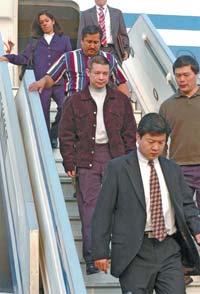Flight of the fugitives

Li Dongzhe, one of China’s most wanted economic fugitives who has been hiding out in North Vancouver for the last six years, has returned to his homeland and turned himself in, Beijing’s Ministry of Public Security has announced.
Li, 47, who will face trial for an alleged billion-yuan banknote fraud, arrived in Beijing from Canada last week, the ministry said.
The ministry declined to comment on whether Li will face fresh charges or the death penalty and on whether other fugitives related to the same case, including Li’s brother, Li Dongue also believed to be in the Vancouver area, will be brought back.
The ministry said that following increased deterrents and efforts to seek the arrest of suspects who had fled abroad, Li had decided to return.
Until last year, at least 580 of China’s economic fugitives were still at large in foreign countries, with most fleeing to North America and Southeast Asia. Li is one of the top 10 fugitives facing charges of economic fraud, according to the ministry’s economic crime investigation department, China Daily reported.
The Li brothers and another fugitive banker Gao Shan fled to Canada’s westcoast in 2004 just as financial authorities discovered that almost 300 million yuan ($47.5 m) had disappeared from the savings account of the Northeast Expressway company at the Hesongjie branch of Bank of China in Harbin, Heilongjiang province. It was the biggest financial fraud case in Heilongjiang since 1949.
Police soon found that several companies, including Northeast Expressway, Chenneng Risk Investment and Heilongjiang Social Insurance Administration, were involved in the case and the amount of money involved was up to 1 billion yuan.
Li, was the former chairman of Beijing Oasis Investment Company, was a school classmate of Gao Shan, former president of Hesongjie branch of Bank of China. Li in 2000 then got to know Zhang Xiaoguang, a former executive of Northeast Expressway.
According to local media reports, Li offered a bribe of 7 million yuan to Zhang and purchased an Audi car and estate for his mistress. Zhang ordered Northeast Expressway to open account in Hesongjie branch where Gao then transferred most of the deposits to Li.
In December 2004, after transferring tens of million yuan abroad, Li and Gao escaped to Canada, the ministry said.
In January 2005 Zhang was detained by police for allegedly embezzling public funds. Later his wife committed suicide by jumping from their apartment building in Beijing. Shortly afterwards, Zhao Qingbin, former general manager of Chenneng Risk Investment Company, also jumped from a building and killed himself.
In February 2007, Canadian police arrested Gao and his wife in Vancouver because their tourist visas had expired.
Meng Qingfeng, head of the economic crime investigation department, told China Daily that the biggest hurdle to getting these fugitives back was the different judicial systems and the absence of extradition treaties between China and some Western nations.
“Trying to repatriate fugitives through other channels such as immigration laws is more complex and the procedures are so lengthy,” he said.
China has signed extradition treaties with 37 countries and criminal justice agreements with 47 others, he said.
“China will adhere to relevant international conventions to protect human rights and other legitimate rights of fugitives in line with China’s laws and regulations,” Meng said. “We hope the fugitives still at large offer to turn themselves in and they will be treated in a just manner.”
The Li brothers had applied to stay in Canada as refugees but their claims were rejected.
They followed another trio of financial fugitives to Canada.
In that case, the fugitives were as Xu Chaofan, Xu Guojan and Yu Shendong and linked to the massive Bank of China scandal.
Prosecutors allege that these fugitives created a network of phony companies, staged sham marriages and used fraudulent visas to launder the cash in Canada, Hong Kong, Australia, Macau and the United States between 1991 and 2004.
There were arrested in the United States after leaving British Columbia.
Yu agreed to return to China and testify against his alleged co-conspirators after Beijing agreed to waive the death penalty and keep him in jail for no more than 12 years. His wife, who was part of the fraud, and their children have been allowed to stay in the United States.
The other two ex-bankers and their wives have denied the charges, saying they are being made scapegoats in China’s crackdown on corruption.
The Asian Pacific Post reported in 2006 that the three suspects used Richmond, B.C. as a base to stash millions of the stolen loot.
The group bought at least three houses in Richmond while stashing large amounts of cash into accounts at the Royal Bank Canada branch on Ackroyd Road in Richmond and the Vancouver-area branches of the Hong Kong Shanghai Banking Corporation and the Canadian Imperial Bank of Commerce.
American investigators, with help from forensic accountants in Vancouver, have identified the addresses of the properties in Richmond as being located at 6171 Udy Road, 6160 Udy Road and 6620 Mang Road.
In addition, the group also purchased huge amounts of jewellery, expensive watches and gold figurines, all of which have been seized by American authorities.
Another high profile fugitive Lai Changxing, the alleged mastermind of a massive billion dollar smuggling operation in China was returned to Beijing last year after more than a 12 year fight to stay in Canada.
Leave a comment









